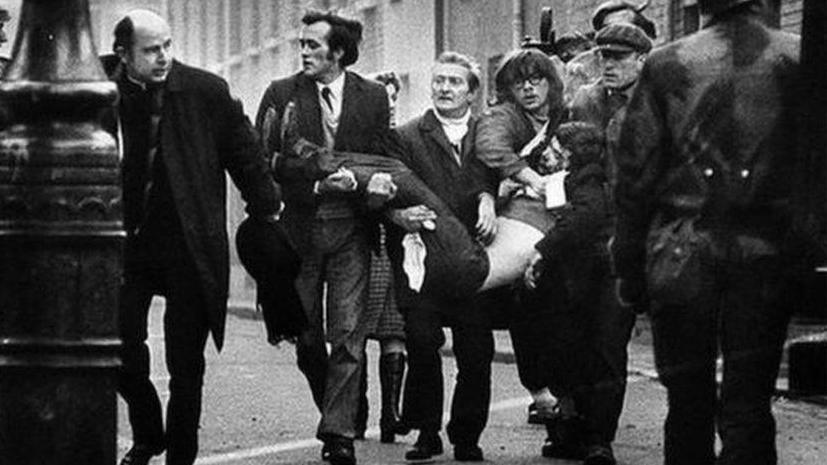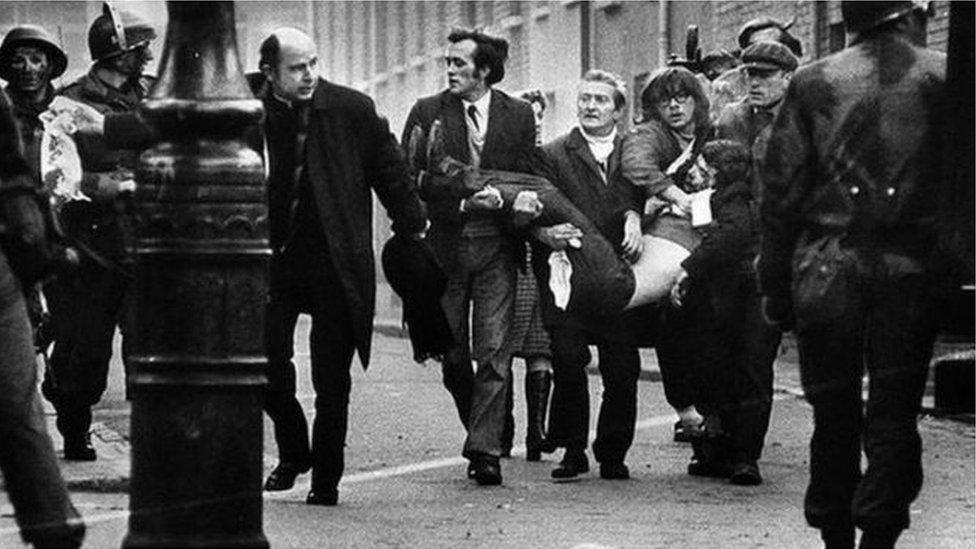Bloody Sunday deaths 'unnecessary and gratuitous', court told
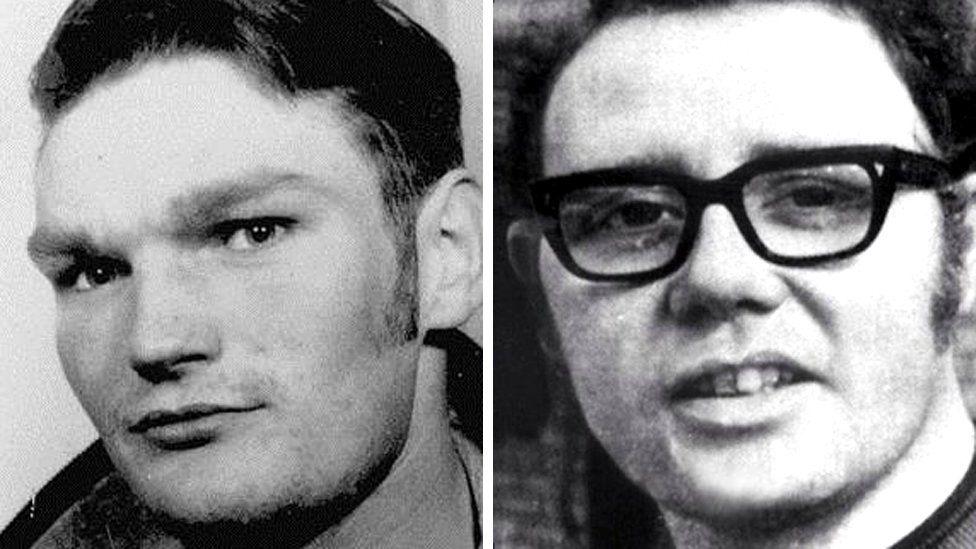
Soldier F is accused of murdering James Wray (left) and William McKinney
- Published
The shooting dead of two men on Bloody Sunday was "unnecessary and gratuitous", the trial of a former British soldier has been told.
Soldier F is accused of murdering James Wray, 22, and William McKinney, 26, as well as five counts of attempted murder in 1972.
Thirteen people were shot dead by the Parachute Regiment when it opened fire on civil rights demonstrators in the Bogside area of Londonderry. About 15 others were wounded.
The non-jury trial is taking place at Belfast Crown Court, where Soldier F is screened from public view by a black curtain around part of the dock.
The former paratrooper, whose identity remains protected by a court order, has entered pleas of not guilty.
He also denies the five counts of attempted murder.
Soldier F is further accused of attempting to murder Patrick O'Donnell, Joseph Friel, Joe Mahon, Michael Quinn and an unknown person.
Three of those he allegedly wounded will testify during the trial.
'Unjustified'
Prosecution lawyer Louis Mably KC said the shootings were "unjustified" and none of the victims posed any threat.
"They were unarmed and shot as they ran away."
Mr Mably went on to allege that the soldiers who fired, including Soldier F, then gave a false account of what had happened.
"What they did was to falsely claim that the civilians they targeted were armed," he said.
"It was demonstrably false."
Mr Mably told the court Bloody Sunday had had a "long lasting and profound effect" on Northern Ireland.
He said the trial would have a narrow and specific focus on events that took place in a courtyard in the Glenfada Park area of Derry's Bogside.
Soldier F, he said, was "part of a small group of soldiers who moved west from Rossville Street into that courtyard".
That group of soldiers, he added, opened fire "with their self-loading rifles shooting at the civilians as they ran away".
He said the civilians in the courtyard were unarmed and "did not pose a threat to the soldiers and nor could the soldiers have believed that they did".
The soldiers' statements would be subject to a hearsay application on Wednesday that would determine their admissibility, Mr Mably said.
That hearing, he said, was the first "substantive matter" in the case.
'Bullets spitting around'
Setting out the circumstances of the shootings in the courtyard at Glenfada Park, Mr Mably told the court those who had been shot had been hit in the back or side, as they headed towards an exit on to Abbey Street.
The soldiers, who he described as "unprofessional", had lost control of themselves, he said.
"Shooting people as they ran away... an act which disgraced the British army," he said.
On Monday afternoon, a prosecution lawyer read a statement from the late civil rights leader Ivan Cooper, one of the main organisers of the march, which he gave to the criminal investigation in 2015.
He described seeing members of the Parachute Regiment wearing face paint and carrying rifles on the morning of Bloody Sunday, near St Eugene's Cathedral, where people were attending Mass.
Mr Cooper believed this was an attempt by the soldiers to discourage people from attending the demonstration that afternoon - but said it had the opposite effect.
He said he heard "a number of distinctive cracks" when he was speaking on a platform at Free Derry Corner, and realised "lead was buzzing around me".
As the situation developed, Mr Cooper described "heavy firing" and "bullets spitting around".
He also said "the Army was clearly not interested in talking to anyone".
Ivan Cooper died in 2019.
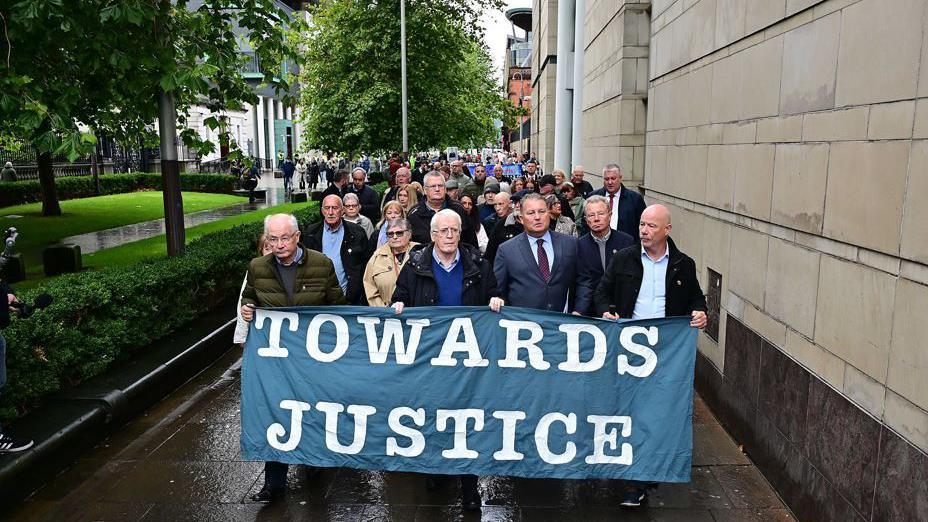
Bloody Sunday families and supporters walked to the Royal Courts of Justice on Monday
Families and friends of those killed on Bloody Sunday as well as scores of supporters took part in a walk to the Royal Courts of Justice in Belfast on Monday, ahead of the opening of the trial.
Those at the front of march carried a large banner saying: "Towards Justice".
Tony Doherty, chair of the Bloody Sunday Trust, said: "This day is a tribute to the strength of the families, whose indefatigable campaign for justice has made this happen."
Speaking on behalf of the McKinney family before entering the court, John McKinney said it marked "a momentous day in our battle to secure justice for our loved ones".
He said families had battled "against the odds" to get here.
"We will shortly occupy the courtroom with our heads held high and with the knowledge that regardless of the ultimate outcome that we are on the right side of history," he said.
Legacy process
Northern Ireland veterans commissioner David Johnstone claimed former soldiers were being subjected to "wholesale demonisation" as a result of the legacy process in Northern Ireland.
Ahead of Monday's hearing, Johnstone called for "a fair and balanced" legacy process.
"The vast majority, and this is important, the vast, vast majority of nearly 300,000 Armed Forces that served here in Northern Ireland during Op Banner (Operation Banner), did so with dignity, with restraint and with professionalism, working to protect communities and to prevent civil war here in this province," he said.
He added that "the stories of soldiers murdered by terrorists receive little media attention, and there's certainly no prospect of a public inquiry into their deaths".
Also speaking outside the court, TUV leader Jim Allister said he had stopped off on his way to London to "show his support" for veterans.
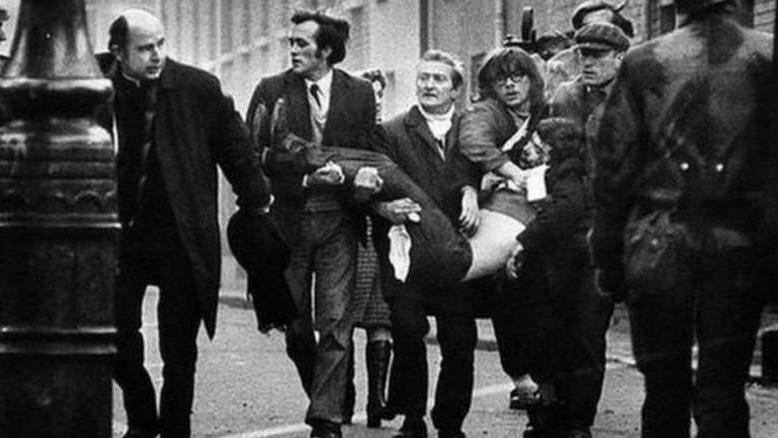
Thirteen people were shot dead by the Army on Bloody Sunday
The decision to charge Soldier F was taken by the Public Prosecution Service (PPS) in 2019.
He was one of 18 former soldiers reported to the PPS as a result of a police investigation, which followed the public inquiry into Bloody Sunday conducted by Lord Saville.
But he was the only one charged.
Two years later, the PPS dropped the case after the collapse of the trial of two other veterans who had been accused of a 1972 murder in Belfast.
But the prosecution resumed in 2022 after a legal challenge.
The key evidence in the Soldier F case is statements given by other soldiers at the time of Bloody Sunday.
The trial judge is likely to decide at an early stage if they are admissible.
Who is Soldier F?
A former British soldier who served with the Army's Parachute Regiment in Northern Ireland during the Troubles
He cannot be named due to an interim court order granting his anonymity
Soldier F is being prosecuted for the murders of William McKinney and James Wray on Bloody Sunday
He also faces charges of attempting to murder Patrick O'Donnell, Joseph Friel, Joe Mahon, Michael Quinn and an unknown person on the same date
- Published18 February
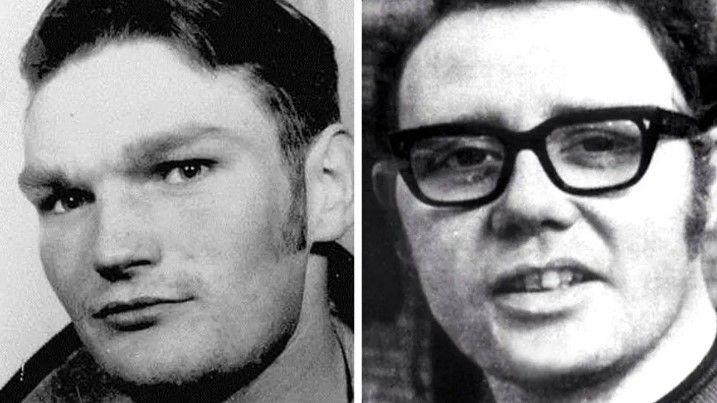
- Published14 June 2024
